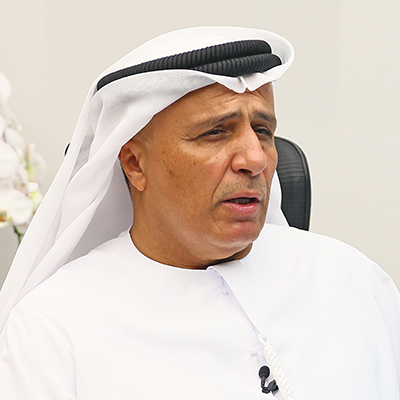

RTA Director General and Chairman of the Board of Executive Directors
Ashfaq Ahmed | Senior Associate Editor
Angel Tesorero | Senior Reporter
The Roads and Transport Authority (RTA) has ensured the delivery of safe public transport across the city, despite the pandemic, by implementing early preventive measures against COVID-19, said Mattar Mohammed Al Tayer, RTA Director General and Chairman of the Board of Executive Directors.
In an exclusive interview with Gulf News, Al Tayer said such measures contributed effectively to the speedy recovery of the public transport sector, while ensuring the health and safety of RTA employees and the riding public.
Al Tayer explained the RTA was quick to formulate its strategy against the spread of COVID-19 because of the established operating procedure in this vital sector. He said: “The response to infectious diseases has been part of the RTA’s risk reduction and management since 2008.”
“(We) supported the government’s campaign against COVID-19 by adopting various measures focusing on four main elements: (1) Protecting the health of all employees; (2) ensuring the safety of the public through sanitisation of all facilities and transport modes; (3) ensuring continuity of services; and (4) supporting the Dubai Government’s efforts in tackling the outbreak of COVID-19,” he added.
Agile response plan
Al Tayer said: “Based on the directions from the National Emergency Crisis and Disasters Management Authority (NCEMA) and the Supreme Committee of Crises and Disaster Management in Dubai, RTA has prepared a dynamic and agile response plan for all modes of transport to ensure the right measures are implemented at all times based on the city’s requirements.”
According to Al Tayer, each agency at the RTA prepared its own plan, monitored the implementation and reported back to the RTA Crisis Team.
The responses include: Social distancing measures; distribution of awareness stickers, deployment of additional staff for implementation and enforcement; disinfection of transport facilities; constant reminder on health protocols; mandatory use of face masks; regular screening of transport frontline employees; and achieving very high percentage of vaccination among transport frontline staff — which is approximately 95 per cent.
Daily sanitary routine
Al Tayer enumerated: “We sanitise our fleet and facilities daily, including the entire Metro and tram fleets of 79 trains and 11 trams; 47 Metro stations and 11 tram stations; 1,372 buses, five bus depots and 17 bus stations; and the entire taxi fleet, in addition to limousines and shared transport numbering to 17,000 vehicles.”
He continued: “In addition to the sanitisation of various public transport modes, the following measures were introduced: The passenger capacity of public transport modes including metro, trams and buses and marine transport was reduced to enforce social distancing between riders; crowd control was enforced at the entrances of public transport stations; taxis were allowed to carry only two passengers with the driver; the use of masks on board public transport modes was made mandatory; access to lifts was limited to two people and the use of escalators was restricted.”
Smart services
With RTA’s migration to smart services, it has managed to keep all services available to the public 24/7. The need for physical contact was reduced and transactions were made faster through RTA website and four digital channels.
Various protocols were also introduced at Customer Happiness Centres to ensure a safe environment for both the customers and RTA staff. The measures included: Frequent disinfection and sanitisation of all RTA Happiness Centres; prominent display of awareness signs and posters; use of thermal cameras to measure customers’ temperatures and detect people without masks; implementing safe distancing; and provision of hand sanitisers, face masks, and gloves.
AI against COVID-19
RTA also utilised Artificial Intelligence (AI) technologies, such as computer vision and machine learning algorithms in detecting and reporting violations of COVID-19 preventive measures. Unlike surveillance cameras fitted to taxis to verify complaints from passengers, the technology has been a proactive measure in determining the driver’s on-road behaviour on the spot.
Monitoring also covered physical distancing and wearing of face masks onboard taxis, whether by passengers or drivers. The quality of images captured by the AI systems and transmitted to the monitoring centre for analysis went up as high as 99.92%.
Recognition from Harvard for RTA
Back in June this year, the RTA was given the ‘Dealing with COVID-19’ Award 2021 (Diamond Level) by the Harvard University Business Council in recognition of its outstanding results in dealing with the pandemic.
The award was also a recognition of the gradual resumption of commercial and tourist activities and life back to normal in Dubai. It also cemented the image of Dubai as a global destination compliant with COVID-19 preventive measures.
Last year, the RTA won the Global Certification for COVID-19 prevention measures from the Norwegian DNV.GL, one of the prominent international entities in the evaluation of infection control programmes and associated risk management, including performance-related health and preventive measures. The company conducted a field survey and a comprehensive evaluation of all precautionary health and preventive measures taken by the RTA to protect public transport passengers and customers, besides protecting its employees working in various affiliated facilities.
Always moving forward
Despite the impact of COVID-19 across businesses, the RTA succeeded in turning the crisis into an opportunity by improving the processes in the transport sector. Dubai’s commercial transport sector had registered healthy growth rates — with the delivery sector expanding by as much as 355 per cent in 2020, RTA noted.
The RTA also registered healthy growth rates in heavy truck transportation (47 per cent); transportation of passengers in rented coaches (39 per cent), and light truck transportation (34 per cent). The authority licensed more than 26,000 new vehicles of various types, up by 11 per cent from the previous year. Overall, there was a nine per cent increase in the number of commercial transport companies registered in the RTA despite COVID-19 pandemic.
Mattar Mohammed Al Tayer, Director General and Chairman of the Board of Executive Directors, Roads and Transport Authority.